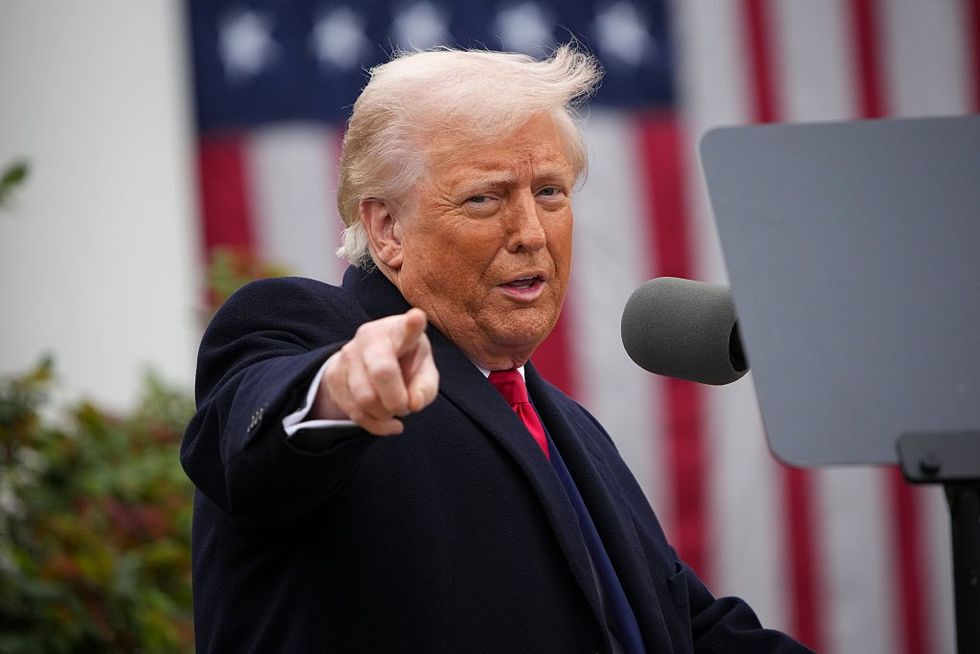Donald Trump announces 10 per cent reciprocal tariffs on United Kingdom
GB News
OPINION: Trump's 'Liberation Day' tariffs on the UK and EU stand as compelling validation for Brexit, says Lee Cohen.
Don't Miss
Most Read
Trending on GB News
Yesterday, Donald Trump took to the White House Rose Garden to unveil his 'Liberation Day' tariffs, a sweeping policy that imposes a 10% levy on British imports, 20% on goods from the European Union, and as much as 54% on nations like China, which he labels persistent trade violators.
As an American commentator who has consistently observed Trump’s affinity for the UK — not merely as a nation but as a symbol of Brexit’s sovereign resolve — I submit that this represents a calculated gesture toward the United Kingdom, softening the blow for a favoured transatlantic partner while issuing a stern reprimand to the EU for its trade practices.
This tariff structure not only highlights a significant advantage of Britain’s departure from the EU but also offers a robust case for the enduring wisdom of that decision.
Trump’s tariff strategy is the cornerstone of his “Make America Wealthy Again” vision, designed to rebalance global trade in favour of US interests. It establishes a 10% baseline duty on all imports, with escalated rates for countries perceived to exploit American markets disproportionately.
The EU faces a 20% tariff, reflecting its accumulated trade barriers, while Britain joins a select group, including Brazil, at the lower 10%. This distinction carries weight. From a US perspective, it signals Trump’s recognition of Britain as a more equitable trading partner, unshackled from the EU’s structural inefficiencies and protectionist tendencies.
The United States stands as Britain’s largest single export market, absorbing everything from machinery to luxury goods. While a 10% tariff introduces undeniable challenges for British firms, it remains a far lighter burden than the 20% rate imposed on their European counterparts.
This preferential treatment aligns with a Trumpian esteem for nations that prioritise self-determination — a principle Brexit champion and one Trump appears to commend through this policy.

Brexit Britain vindicated while EU reeling as Trump tariff hammer falls - Lee Cohen
GB News/Getty Images
The numerical contrast — 10% for Britain versus 20% for the EU—crystallises the practical edge Brexit has conferred.
Had Britain remained bound to the EU, its exporters would now confront a tariff twice as steep, severely disrupting commerce with America and threatening industries from automotive manufacturing to premium spirits.
Instead, its autonomy has secured a meaningful shield, preserving economic stability in key sectors.
Beyond this immediate relief, Britain escapes the EU’s probable counteroffensive — an escalating exchange of trade barriers that could climb past 40%, as Brussels attempts to match Trump’s unyielding stance.
The UK is free to pursue a more measured approach, maintaining equilibrium or exploring negotiated concessions with Washington.
Such flexibility is a luxury the EU’s rigid, collective framework cannot afford. The EU’s steadfast commitment to restrictive standards—often framed as consumer protections but criticised as thinly veiled trade obstacles — has provoked Trump’s response, positioning Britain to adapt and capitalise where its former bloc partners falter.
MORE OPINION
* Britain's big hitters are fleeing the country after Rachel Reeves' budget and I have the proof - Adam Brooks
* Want to thrive in two-tier Britain? Don't be straight, white, male or just a woman - Renee Hoenderkamp
This tariff arrangement strengthens the British-American partnership, extending its implications beyond short-term economics. The United States and Britain share a deep historical connection, reinforced by a mutual wariness of supranational overreach—a sentiment that resonates from Westminster to Washington.
Trump’s policy reflects this kinship, treating the UK as a strategic collaborator rather than a competitor ensnared in EU regulatory tangles.
The 10% levy will affect British exports—think luxury apparel, whisky, and high-end machinery—but it’s a navigable obstacle compared to the EU’s 20% imposition, which threatens to stifle continental trade flows. From an American vantage point, Britain’s durability and agility stand out, qualities that surpass Europe’s more ponderous economic systems.
Trump’s well-documented negotiation instincts suggest an openness to future bilateral discussions, potentially deepening Britain’s advantage.
Moreover, this tariff divide might encourage EU manufacturers to shift operations to the UK, leveraging lower U.S. duties while retaining a European foothold—a development that could invigorate British industry, create jobs, and attract investment.

Britain is well-positioned to benefit from Trump's America.
Getty Images
Critics underscore the broader consequences of Trump’s tariffs, and their concerns merit consideration.
These duties impose a substantial cost on consumers, likely dampening global economic momentum as supply chains adjust. Trump counters that they will spark a US revival, projecting £6 trillion in investment as companies establish domestic operations to sidestep import costs.
Historical evidence offers a nuanced view — previous tariff efforts have delivered mixed outcomes, bolstering some industries while complicating supply chains for manufacturers reliant on foreign components.
Yet the US economy’s responsiveness, its capacity to reorient swiftly under pressure, provides a competitive edge over Europe’s more regulated markets. Britain mirrors this vitality, a shared trait that Trump’s policy enhances, enabling the UK to manage this global shift more adeptly than its continental neighbours.
Trump’s tariffs—10% for Britain, 20% for the EU—stand as a compelling validation of Brexit’s spirit and foresight. The UK’s reduced load is not merely a respite; it’s a strategic win, illuminating the rewards of independence in a reordered global landscape.
From this American perspective, Britain’s EU exit proves astute, equipping it to address Trump’s trade measures with greater finesse than the burdened EU. This moment offers not a hindrance but a prospect—one that reinforces sovereignty’s value and the resilience of transatlantic bonds.
As the EU contends with its tariff-driven difficulties, Britain is well-positioned to benefit. The takeaway is clear: in Trump’s America, Britain’s Brexit wager is delivering measurable returns.







